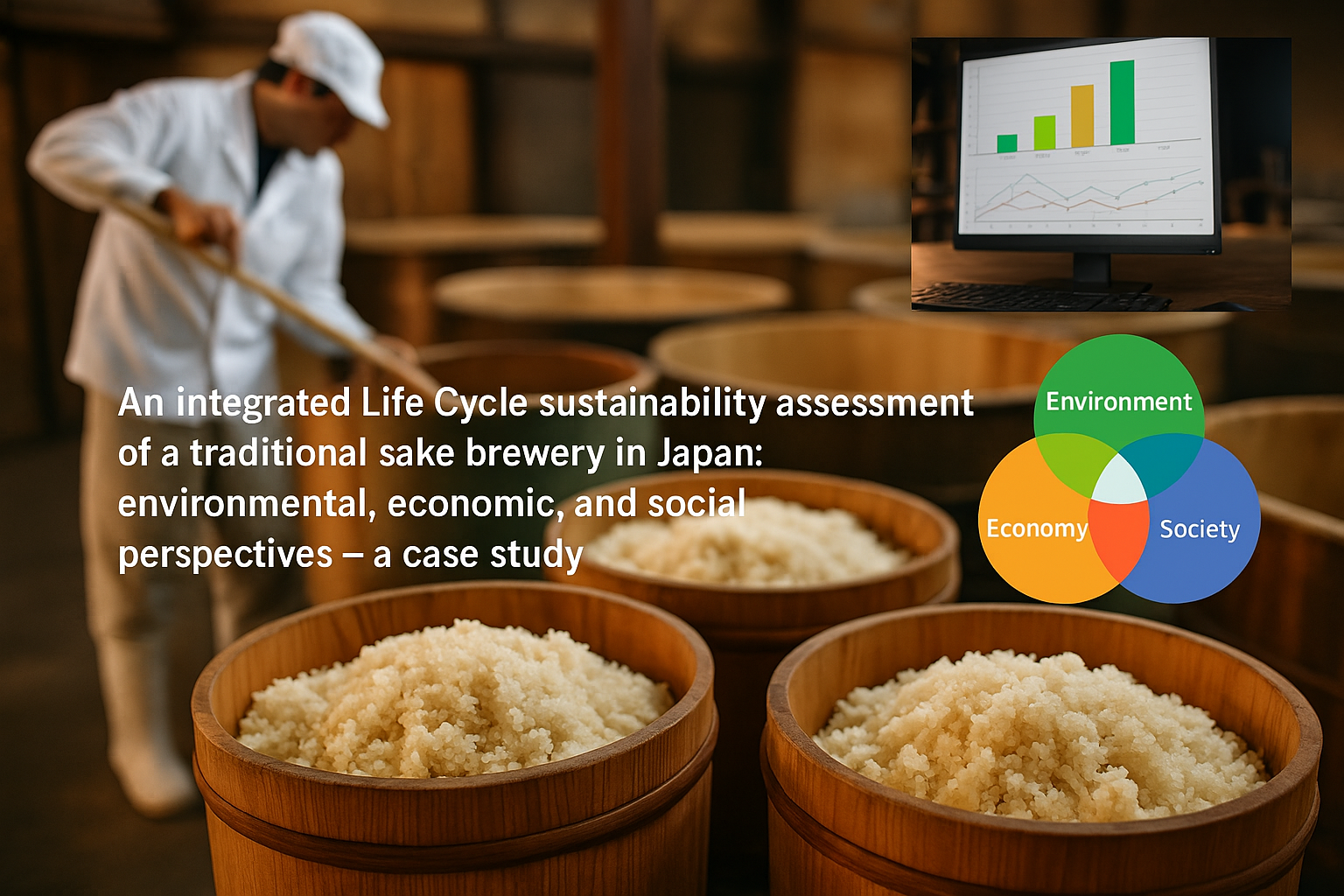日本の伝統的な酒蔵は、文化的な遺産を守りながら、現代の持続可能性目標にも応えていくという課題に直面しています。本研究では、ライフサイクルアセスメント(LCA)、ライフサイクルコスティング(LCC)、ソーシャルライフサイクルアセスメント(sLCA)を組み合わせた統合的な枠組みを提示し、小規模な伝統産業の持続可能性を包括的に評価しました。ケーススタディとして歴史ある酒蔵を対象に、環境影響、ライフサイクルコスト、地域社会や文化的価値を含む社会的側面を酒造りのプロセス全体で捉えました。さらに、シナリオ分析として「地元産米の調達」と「人材活用の改善」という2つの戦略を検討しました。
この統合的な評価により、持続可能性の各側面の間に大きなトレードオフがあることが明らかになりました。たとえば、地元産米の調達は温室効果ガス排出量を大幅に削減(製品のカーボンフットプリントを約60%削減)し、地域社会への利益を強化しましたが、地元原料の価格が高いため生産コストは上昇しました。一方、労働条件の改善(賃金引き上げなど)は従業員の幸福度を高めましたが、地域の雇用機会をわずかに減少させる結果となりました。これらの結果は、環境、経済、社会の目標を同時に満たすためには、バランスの取れた戦略が必要であることを示しています。
総じて、本研究は伝統的な酒蔵に特化したライフサイクル持続可能性評価枠組みの有効性を示しました。この枠組みによって、酒蔵経営者や政策立案者は、どの介入策が持続可能性の効果を最大化できるか、またどのようなトレードオフが存在するかを包括的に理解できます。複数の持続可能性の側面を明示的に考慮した意思決定を可能にすることで、本研究は地域の伝統産業における持続可能な移行を後押しし、文化的遺産の保全と両立させることに貢献します。
Traditional sake breweries in Japan face the challenge of maintaining cultural heritage while meeting modern sustainability goals. This study presents an integrated framework combining life cycle assessment (LCA), life cycle costing (LCC), and social life cycle assessment (sLCA) to holistically evaluate sustainability in these small-scale traditional industries. The framework is applied to a historic sake brewery as a case study, capturing environmental impacts, life cycle costs, and social implications (including community and heritage values) across the sake production process. Scenario analysis is conducted to explore potential improvement strategies, focusing specifically on two scenarios: sourcing locally grown rice and enhancing human resource practices.
This integrated assessment revealed significant trade-offs between sustainability dimensions. Sourcing local rice substantially reduced greenhouse gas emissions (cutting the product’s carbon footprint by nearly 60 %) and strengthened community benefits, but it increased production costs due to higher local material prices. Conversely, improving labor conditions (e.g., raising wages) enhanced worker well-being yet slightly decreased regional employment opportunities. These findings highlight the need for balanced strategies that concurrently address environmental, economic, and social objectives.
Overall, the study demonstrates the value of a tailored life cycle sustainability assessment framework for guiding sustainability improvement in traditional sake breweries and similar craft industries. The insights provide brewery owners and policymakers with a comprehensive understanding of where interventions can maximize sustainability benefits, and the potential trade-offs involved. By enabling more informed decision making that explicitly considers multiple sustainability dimensions, the study supports sustainability transitions in regional craft sectors while preserving cultural heritage.
雑誌名
Journal of Cleaner Production
発表タイトル
An integrated life cycle sustainability assessment of a traditional sake brewery in Japan: environmental, economic, and social perspectives – a case study
著者名
Yuna Seo, Ryota Mori, Shini Ooyama
引用
Seo, Y., Mori, R., Ooyama, S. (2025).An integrated life cycle sustainability assessment of a traditional sake brewery in Japan: environmental, economic, and social perspectives – a case study, Journal of Cleaner Production, 146352. https://doi.org/10.1016/j.jclepro.2025.146352



